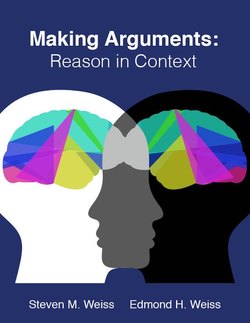Читать книгу Making Arguments: Reason in Context - Edmond H. Weiss - Страница 4
На сайте Литреса книга снята с продажи.
Chapter 1: Modes and Principles of Argumentation
ОглавлениеLee and Bailey, two attorneys, are airing their frustrations with the process of presenting cases in court.
Lee:
I don’t think it’s worth the effort any more. I just concluded a trial in which I offered five compelling and independent lines of argument in favor of my client, the plaintiff in the case. My logic was flawless, my evidence unimpeachable, my witnesses solid. It was a slam-dunk. Yet the jury voted a “0” award. I was so perplexed by their decision that I asked the judge if I could interview them about their verdict. He and the jurors agreed that this would be OK.
To my surprise, one—and only one—silly question asked by the defense attorney turned them against me. When I heard the question during the trial, I blew it off in my own mind as inconsequential and petty. I didn’t even attempt to respond, so insignificant was it. Nevertheless, that’s what got to them and made up their minds. I asked the jury about my five compelling points. To a person they agreed with all my points and felt that I had presented a virtually ironclad case. Yet they voted on that one question.
What’s the point? Since rationality and logic can’t prevail in a court, why bother to do it the right way, if at all?
Bailey:
I’ve had a successful run as an attorney. But I find increasingly that I can’t win, because juries can’t deal with complex technical issues put before them. Jurors don’t have Ph.D.’s, they are not scientists, and they can’t follow complex technical issues in the law. If I can’t boil down a case to something that a twelve-year-old could process, I have very little chance of assuring a good outcome for my client. For instance, I recently was in a case where the jury, mostly high school graduates or less, had to listen to weeks of forensic and medical evidence that was very difficult to follow. In fact, before the jury even heard this evidence a consultant had to give them an orientation to understanding the evidence. It was “How to Understand Evidence 101,” and I could see on the jury’s faces that they were “checking out,” just like bored and under-prepared students check out from a monotonous science lecture they don’t understand. If I can’t get to the jury, how can I win?
Lee and Bailey represent the two main threads of thought that weave through the study of argument and have woven through it almost since the beginning of discourse studies. Lee believes that argument is, ultimately, a rational enterprise. His yardstick for success in argumentation is pure and formalistic, almost mathematical. He believes that if his arguments are logical, the evidence true and unchallenged, the positions meticulously and unambiguously organized… that in such cases he cannot lose. In this view, the rational process must triumph over its opposite or its lesser, necessarily and inevitably. Lee doesn’t just present a case: he proves it. And the proof—true facts linked with universally accepted logical connections—should hold for any audience, anywhere, any time.
Bailey on the other hand, is focused almost entirely on the immediate audience for her case. She is not unconcerned with truth or logic, but she knows that if she can “get to” the jury, then the complexities of evidence and reasoning will matter less. For her, argument is about what works, what hooks this particular audience (or jury or market) into the conclusion and outcome she wants. As an attorney, she is reluctant to admit that there are universal standards or criteria for well-made arguments, because, in her view, a given case requires a specific strategy keyed to a particular audience, in a particular context, on a particular day. Logic and evidence alone rarely prevail—unless the advocate can also tap into, and manipulate, the evaluative processes of the decision makers. Her approach is anathema to Lee, who can’t imagine why any group of “reasonable” people would not be convinced by the irresistible logic of his case.
Both these threads can be traced two and a half millennia to Aristotle. In his Rhetoric, the first comprehensive treatment of argument, he discussed—in separate sections—first, how one can build logical arguments, or, second, how one can appeal to the responses of the audience. In Aristotle’s conception, the logical argument is the province only of the rational person—the “philosopher”—who can be dispassionately devoted to the study of reasoned discussion. In contrast, the need to examine the audience—including its prejudices and even its ignorance—recognizes that not all people are as rational as philosophers. These lay, less-than-fully-rational audiences—driven by emotion and susceptible to flattery and pity—are so different from philosophers that logical, rational argumentation may be regarded as the philosopher’s proprietary method of reasoning (dialectic), which is an entire, separate system in its own right..
